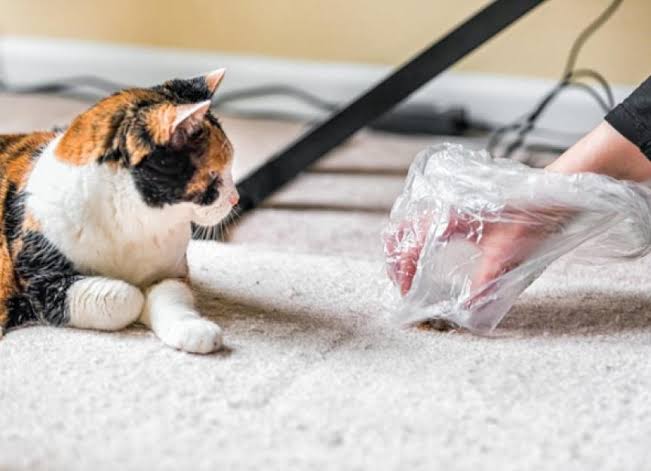
How to Handle Hairballs in Cats
This article provides cat owners with information on why cats get hairballs, how to recognize the signs, and effective strategies for managing and preventing them, including dietary changes, grooming tips, and when to consult a veterinarian.
🐶 Pet Star
12 min read · 1, Feb 2025

Why Do Cats Get Hairballs? The Grooming Process
Now, you see, cats are meticulous groomers. They spend a good portion of their day licking their fur to keep it clean and tidy. But all that licking means they swallow a lot of hair. Normally, small amounts of hair pass through their digestive system without any problems. However, sometimes the hair clumps together in the stomach, forming a hairball.
Recognizing the Signs: When to Worry
The telltale sign of a hairball is that distinctive hacking sound, followed by, well, a hairball! It's a cylindrical clump of hair, often mixed with some stomach fluids or food. It's not a pretty sight, but it's a common occurrence for cats. However, if your cat is trying to cough up a hairball but nothing comes out, or if they're vomiting frequently, losing their appetite, or seem lethargic, it's time to consult with your veterinarian. These could be signs of a more serious problem, like a blockage in their digestive tract.
Managing Hairballs: Dietary Approaches
Now, how can you manage these hairy situations? Diet plays a big role. There are special cat foods formulated to help reduce hairballs. These foods often contain extra fiber, which helps move the hair through the digestive system. Talk to your veterinarian about whether a hairball-specific food would be a good option for your feline friend.
Grooming is Key: Regular Brushing
Grooming is another essential part of hairball management. Regular brushing, especially for long-haired cats, helps remove loose hair before your cat can swallow it. Think of it as preemptive hairball prevention! And it's a wonderful bonding experience for you and your cat.
Hairball Remedies: Over-the-Counter Options
There are also over-the-counter hairball remedies available, like pastes or treats. These usually contain lubricants that help the hairball pass through the digestive tract more easily. However, it's always a good idea to talk to your veterinarian before giving your cat any supplements or medications.
When to See a Vet: Recognizing Potential Problems
While occasional hairballs are usually nothing to worry about, it's important to know when to seek veterinary care. If your cat is having frequent hairballs, or if they're showing any other signs of illness, don't hesitate to schedule an appointment. Your veterinarian can rule out any underlying medical conditions and recommend the best course of treatment.
Preventing Hairballs: A Proactive Approach
Prevention is always better than cure! Regular brushing, a balanced diet, and plenty of fresh water are key to keeping hairballs at bay. And remember, every cat is different. Some cats are more prone to hairballs than others. Pay attention to your cat's individual needs and adjust their care accordingly.
Living with a Cat: Hairballs and All!
Hairballs are just a part of life with a cat. They're not pleasant, but they're usually not a cause for serious concern. By understanding why cats get hairballs, recognizing the signs, and taking proactive steps to manage them, you can help your feline friend live a happy and healthy life, hairballs and all!
Q&A Section:
Q1: My cat throws up hairballs all the time. Is that normal?
Ans: While occasional hairballs are common, frequent hairballs could be a sign of an underlying issue. It's best to consult with your veterinarian to rule out any medical problems.
Q2: My cat is a short-haired breed. Do I still need to worry about hairballs?
Ans: Even short-haired cats can get hairballs, although they might not be as frequent as in long-haired breeds. Regular grooming is still important, even for short-haired cats.
Q3: Are there any specific grooming tips to prevent hairballs?
Ans: Yes! Use a brush that's appropriate for your cat's fur type. For long-haired cats, a de-shedding tool can be very helpful. Brush your cat regularly, ideally a few times a week, to remove loose hair.
Q4: My cat is a picky eater. How can I get her to eat hairball-control food?
Ans: You can try mixing a small amount of the new food with her current food and gradually increasing the ratio over a few days. You can also try different flavors or textures of hairball-control food to see what she prefers.
Q5: Are there any home remedies for hairballs?
Ans: While some people suggest giving cats small amounts of petroleum jelly or mineral oil, it's best to talk to your veterinarian before trying any home remedies. They can advise you on the safest and most effective options for your cat.
Similar Articles
Find more relatable content in similar Articles
Explore Other Categories
© 2024 Copyrights by rPets. All Rights Reserved.